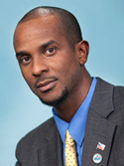NSU Newsroom
SharkBytes
Horizons
This version of NSU News has been archived as of February 28, 2019. To search through archived articles, visit nova.edu/search. To access the new version of NSU News, visit news.nova.edu.
This version of SharkBytes has been archived as of February 28, 2019. To search through archived articles, visit nova.edu/search. To access the new version of SharkBytes, visit sharkbytes.nova.edu.
Nova Southeastern University Debuts New Genocide Prevention Lecture Series

Jason J. Campbell, Ph.D., assistant professor of Conflict Resolution and Genocide Studies in NSU’s Graduate School of Humanities and Social Sciences
FORT LAUDERDALE-DAVIE, Fla. – January 15, 2014 –
Genocide.
Merriam-Webster’s Dictionary defines it as “the deliberate killing of people who belong to a particular racial, political or cultural group.”
For those of a certain generation, hearing the word “genocide” conjures up the most infamous example of all – The Holocaust during World War II. Unfortunately, time moves on and memories fade, and today’s generation may not share the recollections of previous generations.
The sad truth is The Holocaust is just one of many instances of genocide, including those taking place across the globe today (i.e. Syria and the Central African Republic.) As a way to bring a renewed focus on this issue, Nova Southeastern University’s (NSU) Graduate School of Humanities and Social Sciences has created its new Genocide Prevention Lecture Series.
The first lecture in the series is scheduled for Friday, February 7th at NSU’s Carl DeSantis Building, 3300 College Ave., Davie (on NSU’s main campus.) The lecture is scheduled for 6–7:30 p.m. with a wine and cheese reception immediately following. The lecture is free and open to the public. Anyone wanting to attend should RSVP to Erica Guterman at 954-262-3003 or via email at guterman@nova.edu.
The lecture series is generously supported by Marta Batmasian, Ph.D., a member of the NSU Huizenga School of Business and Entrepreneurship’s Board of Governors. Being of Armenian descent, the issue of genocide is of significant importance to Batmasian. During the Armenian Genocide, it is estimated that between 1–1.5 million people were killed in the early 1900s.
The inaugural lecture will feature guest speaker Dr. Samuel Totten, a professor of Curriculum & Genocide Studies at the College of Education & Health Professions at the University of Arkansas. Dr. Totten’s work focuses on modern genocides and he has recently done important field research in Africa’s Nuba mountains on the Darfur genocide.
Dr. Totten is the editor of several noteworthy texts on modern genocides including Century of Genocide: Eyewitness Accounts and Critical Views (1997), Genocide in the Twentieth Century: Critical Essays and Eyewitness Testimony (1995), and First Person Accounts of Genocidal Acts Committed in the Twentieth Century (1991). He has also served as an editor and contributor for many academic journals and has written numerous articles and essays on various aspects of genocide as well as genocide and Holocaust education.
Also participating in the lecture is Jason J. Campbell, Ph.D., an assistant professor of Conflict Resolution and Genocide Studies in NSU’s Graduate School of Humanities and Social Sciences. Campbell publishes primarily in the field of genocide awareness and prevention, and his most recent book is entitled Planning a Catastrophe: On the Nature of Genocidal Intent. His research interests include genocide studies and prevention, the problem of evil, state endorsed mass extermination and the theoretical understanding of exclusionary ideologies.
“There’s an old saying: ‘Those who don’t learn from history are doomed to repeat it,’ which is why studying and discussing genocide is necessary if we want to prevent its reoccurrence,” said Campbell.
Perpetrators of genocides build on the fact that the world will not pay attention, and even more disturbing, will soon forget. This lecture series is meant to work against that trend and establish genocide studies in general. The genocide studies within NSU’s graduate programs in Conflict Resolution focus as a means to combat complacency and teach students, and the community, what they can do to prevent genocide.
###
About Nova Southeastern University: Situated on 314 beautiful acres in Fort Lauderdale, Florida, Nova Southeastern University (NSU) is a dynamic, fully accredited research institution dedicated to providing high-quality educational programs at all levels. NSU is a not-for-profit independent institution with an enrollment of 27,000 students. NSU awards associate’s, bachelor’s, master’s, specialist, doctoral and first-professional degrees in a wide range of fields. NSU is classified as a research university with “high research activity” by the Carnegie Foundation for the Advancement of Teaching, and it is one of only 37 universities nationwide to also be awarded Carnegie’s Community Engagement Classification. For more information, please visit www.nova.edu. Celebrating 50 years of academic excellence!
Media Contact:
Joe Donzelli | Office of Public Affairs
954-262-2159 (office)
954-661-4571 (cell)
jdonzelli@nova.edu
